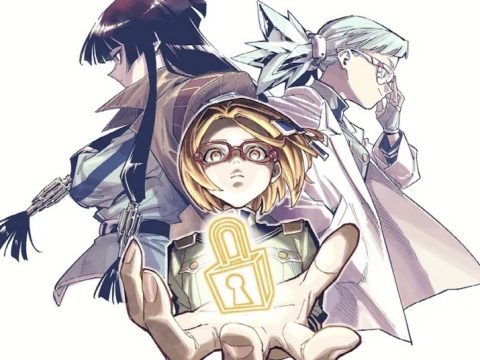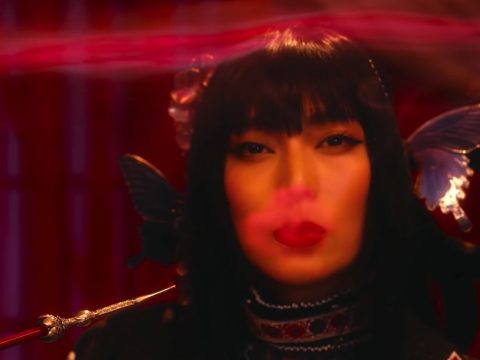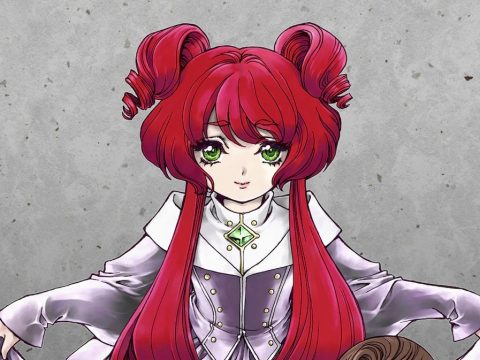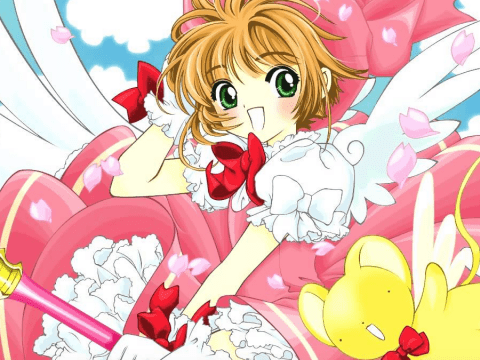
Hey, I’m not hitting on you. I just want to see your book. I was sitting over there mesmerized by the cover for half an hour.” Never mind that I had only been sitting on that bench for less than ten minutes, the scruffy wanderer eagerly took the first volume of Faust: Fiction and Manga from the Cutting Edge of Japanese Pop Culture as I held it out. I couldn’t really blame him for wanting to thumb through it-the cover IS one of the most amazing pieces of printing press attract mode I’ve ever seen: all crazy sparkles and sakura, katana wielding shojo, big midnight navy letters.
“My dad was a drummer. Hey check this out, I got it in Spain,” he pointed at his ring, “I’m crazy. How old are you? I’m 50, but I’m not trying to pick you up, so don’t worry.” The moment was about as weird and random as some of the stuff that happens in this anthology. On the other hand, though, Faust actually does have a pretty distinctive otaku bent, and although most of the stories are original, you’ll notice some scenarios similar to other Japanese media you already enjoy.
The contents are handpicked from the Japanese pop-lit magazine-book series hybrid that has been running since 2003, but also represent some of the works that Del Rey is publishing; for instance, the CLAMP/NISIOISIN collaboration, xxxHOLiC: ANOTHERHOLiC, an excerpt of which kicks off this volume. Above all, though, three pieces stood out the most for me: “Drill Hole in My Brain” by Otaro Maijo, “F-Sensei’s Pocket” by Otsuichi (with illustrations by Takeshi Obata), and the manga, “After School: 7th Class” by NISIOISIN (with art by Yun Kouga).
 “Drill Hole in My Brain” catches your attention right from the opening line, “My mom’s a piece of shit.” You can quibble about shock value and whatnot, but I laughed out loud and continued excitedly. Crazily, the main character barely survives the visit of a homicidal maniac (whereas most of his family is not so lucky), but the unfortunate catch is the screwdriver stuck in his brain in such a way that he is suddenly two people at once, Hideaki Kato at the scene of the murder, and Makoto Muraki, a super hero with a hole in his head, which he thinks can only be filled by his proto-girlfriend Akana’s unicorn horn. And if you think that sounds really sexual, it is. So, you learn about how Makoto discovers how multi-faceted sex can be, experience the stress of being the only person who can save the world, and end up with one of the most trippy and unique short stories you have probably read in a long time. Honestly, this story was what really got me hooked on the whole book.
“Drill Hole in My Brain” catches your attention right from the opening line, “My mom’s a piece of shit.” You can quibble about shock value and whatnot, but I laughed out loud and continued excitedly. Crazily, the main character barely survives the visit of a homicidal maniac (whereas most of his family is not so lucky), but the unfortunate catch is the screwdriver stuck in his brain in such a way that he is suddenly two people at once, Hideaki Kato at the scene of the murder, and Makoto Muraki, a super hero with a hole in his head, which he thinks can only be filled by his proto-girlfriend Akana’s unicorn horn. And if you think that sounds really sexual, it is. So, you learn about how Makoto discovers how multi-faceted sex can be, experience the stress of being the only person who can save the world, and end up with one of the most trippy and unique short stories you have probably read in a long time. Honestly, this story was what really got me hooked on the whole book.
Coming right after is a tale with such deep anime/manga roots that Doraemon’s tools of his helpful alien trade somehow find their way into the real world. Yes, the F in “F-Sensei’s Pocket” stands for Fujiko F. Fujio, who created the extraterrestrial, blue cat-thing. The story itself deals with the consequences of having the Fourth-Dimensional Pocket, Take-Copter, Small Light, and other fantastic devices end up in the hands of an outsider bent on revenge. Luckily, throughout the high-context narrative, there are plenty of footnotes for those uninitiated in Doraemon lore. More than the plot, I really enjoyed the brash attitude-the pocket may breach the fourth dimension, but the author punches through the fourth wall by having his protagonist shout things like, “Such a shame! I thought we might get a series out of this concept, but oh, well! That can never happen now, not even if the editors ask for it! Even if the readers love it! Obata doesn’t even want to draw you anymore!”
Among some other stories, interviews (notably one conducted by the editor of Faust, Katsushi Ota, with the creators of the soon-to-be-seven-movies novel, The Garden of Sinners, Kinoku Nasu and Takashi Takeuchi), essays, and excerpts is my final favorite segment, the manga “After School: 7th Class,” which explores a particular type of hell: confronting a genius who makes all of your goals seem pointless, who experiences your struggles as frolics through the park., “My dream is this girl’s reality. [•] I can totally feel all my motivation draining away.” Maybe it’s a little emo, but I love the frustrated ending, and I also love the idea that this job of warden for a dangerous prodigy who has driven her past eleven keepers to suicide can be done by a student…or at least attempted.
Faust is pretty much a must-read for those looking to absorb Japanese geek culture. It’s a surprising mix of anime clichés and other elements that are totally fresh. The $16.95 price tag is more than you would spend on a manga, or even most paperbacks (and there is far more text than art, here), but these stories and artwork are not likely to be found elsewhere. It’ll be interesting to see how they will respond if this volume takes off-I would love to see each issue get translated straight up. For now, though, enjoy Faust #1’s slice of “cutting edge.”
Publisher: Del Rey
Story & Art: FAUST Editors







